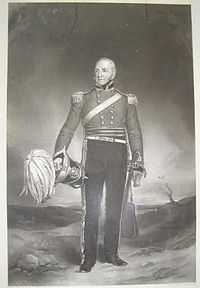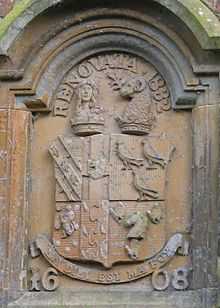George Anthony Legh Keck
| The Right Honourable George Anthony Legh Keck | |
|---|---|
 | |
| Member of Parliament for Leicestershire Leicester (1797-1831) | |
| Succeeded by | Charles March-Phillipps Thomas Paget |
| Personal details | |
| Born | 1774 Stoughton, Leicestershire, England |
| Died | 4 September 1860 Bank Hall, Bretherton, Lancashire |
| Nationality | British |
| Political party | Conservative |
| Spouse(s) | Elizabeth Legh Keck (née Atherton) (1802-1837) |
| Relations | Anthony James Keck Leghs of Lyme |
| Children | None |
| Residence | Bank Hall, Bretherton |
| Occupation | Land Owner |
| Profession | British Army |
| Religion | Church of England |
George Anthony Legh Keck (1774 –1860) was an English landowner and MP.
Early life
He was born at Stoughton Grange, Leicestershire, the son of Anthony James Keck and Elizabeth (née Legh).[1] He was a member of the Legh family of Lyme Hall at Lyme Park, Cheshire. His wife Elizabeth was from Atherton Hall in Atherton.[2] They inherited Bank Hall in Bretherton, Lancashire and renovated it with help from architect George Webster in 1832-33.
Career
Legh Keck represented Leicestershire in Parliament five times between 1797 to 1831.
Legh Keck, in a portrait from 1851 wore a broad topped Shako with a 12-inch white plume held in place by bronze chin scales.[3] 1805 Legh Keck bought the manor of Houghton on the hill which remained in the Lilford family until 1913.[4] Lt.Col. George Anthony Legh Keck, Esquire was a member of the Leicestershire Yeomanry Cavalry from 1803 until his death in 1860.[5] His title within the regiment was 'Colonel of Prince Albert's Own Regiment of Yeomanry Cavalry'.[6]
Legh Keck's nephew was William Legh, 1st Baron Newton who was also a member of Parliament.
Personal life

In 1802 Legh Keck married his cousin Elizabeth Atherton, daughter of Robert Vernon Atherton of Atherton Hall, and Henrietta Maria Legh of Lyme Hall. In 1832 he engaged architect, George Webster to design extensions and renovate Bank Hall, his mansion in Bretherton, Lancashire. Legh Keck attended St Mary's Church, Tarleton where he had box pews for himself and staff. Elizabeth died at Bank Hall in 1837. Legh Keck died aged 86 on 4 September 1860 at Bank Hall and is buried at Stoughton Church.[7]
George Anthony and Elizabeth Legh Keck had no children, the Bank Hall Estates passed to Thomas Atherton Powys ("Lord Lilford III") and the Stoughton estate to his wife's nephew, Henry Littleton Powys. Thomas Atherton Powys (Lord Lilford V) inherited the Bank Hall estates after the death of his father (Lord Lilford III) in March 1861 and the contents of Bank Hall were auctioned in April 1861 to cover death duties. Lord Lilford V then moved to his family seat at Lilford Hall, Northamptonshire, leaving Bank Hall empty and leasing it out.
Arms
|
Collections
Legh Keck collected stuffed animals and birds and sets of horns from animals from all over the world. He owned a collection of classical style statuettes and casts of figures by the sculptor Antonio Canova. In 1830 artist, Thomas Phillips painted a portrait of Legh Keck which is in the Leicester Arts and Museums Service Collection.[11] A large mural painted on the wall of the drawing room at Bank Hall, subject unknown was lost when the roof on the west wing collapsed in the 1980s. There is a collection of Legh Keck's accoutrements held by the Leicestershire Yeomanry Association.[12]
References
- ↑ Leicestershire Yeomanry Association, (2010) "Pre 1900 - G. A. Legh Keck", http://www.paoyeomanry.co.uk/PM/LYPre1900.htm
- ↑ "Family Homes". Leighsaintthomas.wigan.sch.uk. Retrieved 2012-08-17.
- ↑ Morgan-Jones, G. (2008) "The Prince Albert's Own Yeomanry - Leicester Yeomanry" http://www.paoyeomanry.co.uk/LY3.htm
- ↑ JM Lee, RA Mckinley (1964) "Victoria County History - A History of the County of Leicestershire: Volume 5: Gartree Hundred", Pages 157-163, http://www.british-history.ac.uk/report.aspx?compid=22055
- ↑ Sir William Skeffington, Bart. as Colonel of The Leicestershire Yeomanry, c. 1794. Journal of the Society for Army Historical Research, vol. 43 iss. 173, p.27. March 1965.
- ↑ Morgan-Jones, G. (2008) "The Prince Albert's Own Yeomanry - Leicester Yeomanry" http://www.paoyeomanry.co.uk/PM/LYPre1900.htm
- ↑ Leicestershire Rural Partnership, (2008) "Stoughton - George Anthony Legh Keck", http://www.leicestershirevillages.com/stoughton/georgeanthonyleghkeck.html
- ↑ House of Names, "Family Crest and Coat of Arms - Legh", http://www.houseofnames.com/fc.asp?sId=5BBEB2CE-BDDD-4CE4-B85E-5340846EDA96&s=Legh 2010
- ↑ St. Thomas C.E. Primary School, "Coat of Arms - Athertons", http://www.leighsaintthomas.wigan.sch.uk/coat_of_arms.htm#Athertons, 2010
- ↑ Armorial Gold Heraldry Services, "Family Mottoes - Legh Keck, EN DIEU EST MA FOY", http://www.heraldryclipart.com/l.html, 2010
- ↑ Public Catalogue Foundation (2011) "Thomas Phillips - George Anthony Legh Keck", http://www.prints.thepcf.org.uk/image/712925/thomas-phillips-george-anthony-legh-keck-1774-1860#
- ↑ Leicestershire Yeomanry Association (2011) "The Prince Alberts own Yeomanry", http://www.paoyeomanry.co.uk/LYSabretache.htm
External links
- Hansard 1803–2005: contributions in Parliament by George Anthony Legh Keck
- "LEGH KECK, George Anthony (1774-1860)" at historyofparliamentonline.org
| Parliament of Great Britain | ||
|---|---|---|
| Preceded by William Pochin George Anthony Legh-Keck |
Member of Parliament for Leicestershire 1798–1801 With: Sir Edmund Cradock-Hartopp, 1st Baronet |
Succeeded by Parliament of the United Kingdom |
| Parliament of the United Kingdom | ||
| Preceded by Parliament of Great Britain |
Member of Parliament for Leicestershire 1806 – 1831 With: Sir Edmund Cradock-Hartopp, 1st Baronet 1798–1801 Lord Robert Manners 1806–1818, 1820–1831 |
Succeeded by Charles March-Phillipps Thomas Paget |